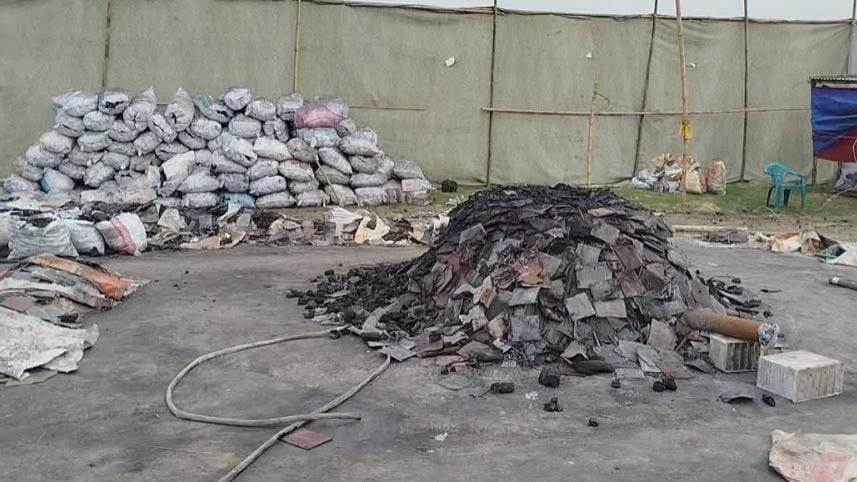Poisoned pasture: Battery recycling plant ravages livestock and livelihoods in Jamalpur

An illegal battery recycling plant nearby Digri Char area in Jamalpur's Sadar upazila has been operating for about a month, polluting the surrounding water bodies and croplands.
The factory in Mirzapur village, on the bank of the Brahmaputra river, is jointly operated by Apel Mahmud, son of Chan Mia of Mirzapur, and a man named Likhan from Sherpur.
The battery factory is being operated without any environmental clearance, said AKM Samiul Alam Kursi, senior chemist at the Department of Environment (DoE) in Jamalpur.

Locals said the factory burns used batteries to recover lead -- releasing toxic fumes and acid waste into the environment. The leftover chemicals are dumped into nearby croplands and the Brahmaputra river, causing lead pollution that endangers crops, animals, and fish.
The pollution took a tragic turn on Wednesday morning, as at least four cows died and eight more fell critically ill after consuming grass and water believed to be contaminated by acid waste from the factory.
The dead cattle belonged to Hekmat Ali, a landless farmer, who has suffered an estimated loss of around Tk 10 lakh. Locals said ducks, hens, and goats from nearby households also perished after exposure to the same toxic contamination.
"We have lost everything. We don't know how we will survive," said Hekmat's daughter Bhabna, breaking down in tears. The family's only source of income was selling milk -- earnings that also funded the education of Hekmat's daughters.
Confirming the incident, Dr Sulaiman Sarkar, a veterinary officer from Mymensingh, said, "Four cows were found dead, and several others are under treatment. Preliminary findings suggest that acid waste from the factory contaminated the nearby grass and water sources."
He cautioned that the contamination presents a grave risk to both livestock and human health, as lead and acid residues may infiltrate the soil and groundwater.
Environmentalists have said that the incident reflects a growing trend of unregulated industrial waste disposal in rural Bangladesh.
"If regulations are not strictly enforced, rivers such as the Brahmaputra will continue to serve as toxic waste dumping grounds, quietly endangering the communities that depend on them for survival," said Jahangir Salim, president of Poribesh Rokkha Andolon in Jamalpur.
When contacted, one of the owners of the battery recycling plant, Apel Mahmud, said they had no idea something like this could happen. "We have now decided to relocate the factory to a safer place and are considering compensation for the affected farmer," he said.
DoE senior chemist Samiul said, "They [factory authorities] did not seek permission, and we were unaware of the factory until the incident. We are now preparing to file a case against them."
Jamalpur Sadar UNO Jinnat Shahid Pinky said, "I only learned about the incident yesterday after returning from training. I have discussed the matter with the Department of Environment, and if they do not act, I will personally file a case. We are determined to prevent any such factory from being established in Jamalpur."




 For all latest news, follow The Daily Star's Google News channel.
For all latest news, follow The Daily Star's Google News channel.
Comments